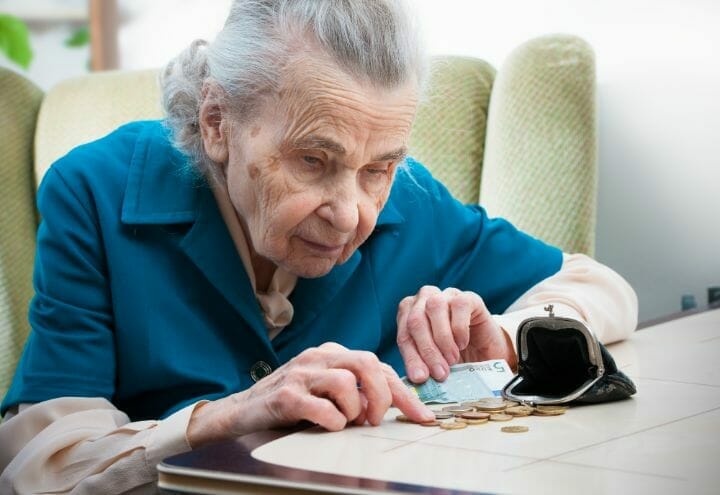Elder abuse is being deemed the crime of the century. Our elderly loved ones often need our help for daily tasks, and they are very grateful for our help so they feel they have to pay us back for our kindness.
Often times, though, our elderly loved ones are very trusting of their family and friends so they open their homes and lives – and sometimes finances – the them.
For most friends and family members, they know the boundaries and are not going to take advantage when their loved one needs help. For some people, though, they may not have great intentions and they take advantage of the elderly for their own gain.
If you suspect your loved one is being taken advantage of by another family member, you want to make sure you speak up because you know your elderly loved one may be on a budget or have finite amounts of money so you don’t want to see them lose everything.
So, if you think your elderly loved one has other friends or family stealing from them and/or taking advantage what can you do?
It’s a difficult situation as they may not know it’s happening and you don’t want to accuse people if it’s not true but you also want to look out for them.
Here is a little more information on a few things you can do if you think your loved one is being taken advantage of so that you can protect them as much as possible.
You might also like How to Protect Your Assets From Nursing Home Care
Types of Elder Abuse
There are a few different types of abuse the elderly community are especially susceptible to.
Physical Abuse
This could include acts like hitting, pushing, shoving, slapping or even kicking. It can often result on bodily harm to the victim, and this can be especially hard for the elderly as they are more frail (as is a result of aging) and could cause serious injury or harm to them.
Psychological Abuse
This kind of abuse can be a little hard to spot as there isn’t going to be any kind of physical signs that it’s happening. It will involve manipulation, yelling, degrading comments or remarks, threats, intimidation or even humiliation.
Often times the elderly are worried about their loved ones not treating them well or including them in family events so they will put up with some abuse of this kind so that they don’t disrupt the balance of their family.
Financial Abuse
This is probably the most common type of abuse committed against the elderly.
It can include cashing an elderly person’s social security cheque and then not giving the money to the person it belongs to, stealing money out of their wallet, or even coercing an elderly person to part with assets by signing them over to you under false pretences.
In some cases, it can be considered a misuse of Power of Attorney, conservatorship or guardianship.
Neglect
As our loved ones begin to age, they will likely have more medical and healthcare needs than they previously did. If you have agreed to help your loved one but then fail to provide the kind of care they need.
This kind of abuse may not be intentional as some loved ones genuinely underestimate the amount of care their parents need and they just get overwhelmed with everything that is going on.
Sexual Abuse
It may not be common to think about this happening with seniors, but unfortunately it does happen. In nursing home or long-term care homes it definitely can happen with residents, and it’s important to remember that any kind of touch with a person who is unable to give full and complete consent is considered sexual abuse.
You might also like What Do Seniors Need to Know About Selling Their Home?
How To Report Elder Abuse
If you are pretty sure that your elderly loved one is being taken advantage of, you should report it. The process for reporting elder abuse does vary from region to region, however the best place to start is with your local law enforcement. They will have the resources as to how to start this process and can direct you as to where to go from here.
There are some areas that have free hotlines, available 24/7, for reporting neglect, abuse and exploitation.
When you make a report you will likely be required to give certain pieces of information. You will have to give the name of the person you believe is being abused or taken advantage of and where they live.
You will also be required to give the name of the person that you believe is taking advantage of them and where this person lives. If you are afraid of the person you suspect of committing the abuse you can choose to remain anonymous, however putting your name on the report can definitely help those who are investigating should they need more information in the future.
In addition to these items, you may be asked where the abuse took place and exactly what you know happened or saw happened. Where the abuse happens could determine which agency handles the investigation.
For example, if the abuse happened in a nursing home or long-term care facility then it will be reported to the Long-Term Care Ombudsman Program. However, the abuse happened elsewhere then APS will generally handle claims of abuse or neglect.
When you make the report, be as specific as possible. For example, saying someone has been ripping off your loved one for years isn’t really helpful. Specific examples, like my sister took my mother’s wallet and all of the money in on a certain date is much more helpful during the investigation.
To fully investigate claims of abuse or neglect, agencies need witnesses to the event(s) in question. The witnesses will be asked what they saw and it’s always helpful if there is more than one person who can corroborate the event.
Why Is It So Important To Report Elder Abuse?
As our loved ones age, they are sometimes less able to do everything for themselves that they once were and so they depend on their children and family members to really help them out. For example, technology is often moving so fast that seniors don’t always keep up with what’s going on.
Also, when someone is taking advantage of them financially it has a really big impact on seniors because they don’t have the earning potential that younger people do. When taking their money people could be jeopardizing their ability to fully pay their bills and take care of themselves.
This is why it’s so important that we stand up for our elderly loved ones and speak on their behalf when we see something is wrong.
If you report it, it takes the responsibility of investigating and pursuing it out of your hands and puts it into law enforcement to look into.
It’s going to be difficult to report this abuse and start the process, especially if the person stealing is also a family member. You might feel like you’re getting in the middle of family and causing conflict, which can be really difficult for family members.
Some elderly people are afraid to report the people who are taking advantage of them because they are fearful of any kind of retaliations that may be taken against them.
For example, if their child is the one taking their money and they rely on them for help with getting to appointments then they will be stuck without any way of getting to the medical appointments they need to get to.
In addition to that, some elderly people may feel like there could be some physical consequences to reporting the abuse and they fear physical or emotional abuse if they say anything.
Your loved one may try to discourage you from reporting the abuse and ask you not to say anything because they are scared. This can make it especially difficult to and you may struggle with your decision, however you need to protect the vulnerable because no one should be taken advantage of when they really need help from their friends and family.
You might also like Helping Seniors with Finances – How Can I Protect My Elderly Parents Money?
How To Prevent Elder Abuse
There are some situations that can make elderly people much more susceptible to abuse. It’s important to identify these situations as risky, and help your loved one navigate through them safely.
There are a few risk factors, including
- Living alone
- Having a functional disability/dependence
- Poor physical health
- Poor mental health or cognitive impairment
- Low income/socioeconomic status
Make sure you take the time to talk to your loved one and open the door for honest communication. By doing so, your parent or family member will likely feel comfortable enough coming to you and talking to you about what’s going on if something were to happen.
Keep an eye out for what’s going on with your loved one and look for significant changes in behaviour or their financial means. If you have concerns about them being mistreated it’s important to start a conversation with them about what your concerns are. Their reaction will probably tell you what is going on and if you have a reason to be concerned.
If you need help talking to your loved one about it, you can reach out to counsellors for support.





